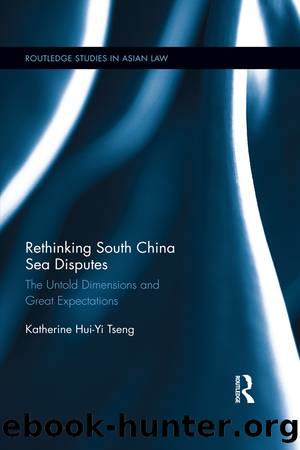Rethinking South China Sea Disputes by Katherine Hui-Yi Tseng

Author:Katherine Hui-Yi Tseng [Tseng, Katherine Hui-Yi]
Language: eng
Format: epub
Tags: Social Science, Regional Studies, Political Science, International Relations, General, Law, Maritime
ISBN: 9781317374770
Google: MzQlDwAAQBAJ
Publisher: Taylor & Francis
Published: 2016-12-08T03:24:42+00:00
D Recontemplating exclusive economic zoning
In this aspect, some reconsiderations are worth the efforts before proposals being attempted.
The EEZ regime is an invention by the Convention in bringing in line diversifying practices in marine resource utilization. The contribution lies, in terms that by the single attribution of the right for resource development into one coastal country would better realize the goal of conservation and development in the marine environment. Also, wrestling toiled among coastal and sea power countries in due course of the negotiation further materializes the fact that the EEZ system is a quid prod quo, or at least compromises, so that the territorial water is confined within a scope of 12 nm from the coast.56 However sublime the intended goal for marine environmental protection is, the single-country management system which is coupled with a spatial jurisdiction in the EEZ is not as productive as what is purposively intended.
On the contrary, this single-country management system has been stymied in delivering the much-awaited outcome of successful marine resource conservation, whose paralysis further leads to anarchical competition for marine resource among countries. One example of blatant evidentiary effect is the request for an advisory opinion of the International Tribunal for the Law of the Sea by a Sub-Regional Fisheries Commission,57 concerning the relatively inefficient EEZ management, by launching a request to clarify responsibilities of flag states and fishery organization that issue fishing authorization in the EEZ of its member countries.58
One sensible explanation to this single-country management system which enables coastal countries to enjoy sovereign rights over marine resources, is rooted from the Westphalian concept towards the international order. In a sense, one way to calibrate national prowess in the Westphalian system is via acquisition of land territories and restriction of access to resources, which may be achieved by formal agreements, extra-treaty actions and violence. Restriction of access to resources could be traced all the way back to the colonial era when not all polities were allowed to join in the international political hierarchy, let alone to partaking in resource sharing and development.59 In the new iteration of the Westphalian international order, this legacy nevertheless has lingered. Yet, its impact is cushioned off by a United Nations institution, under which the throat-cutting competition to resource is less likely to take place. All things equal, this race-to-the-bottom competition is most likely to occur when international law does not render a helpful hand in conflict management, dispute resolution or is in itself the raison dâetre of the problem. In this sense, international law is functioning as one last means to keep the lid on wild aspirations of every country to external competition in a state of lawlessness.
The South China Sea has to some extent fallen into this category, when international law seemingly does not render helping hands to dispute resolution. Under a vacuum of legal authority, power politics fills in the gap, as can be seen for past decades. This helps explains the escalation of recent rounds of tensions, and their consistent focus on resource
Download
This site does not store any files on its server. We only index and link to content provided by other sites. Please contact the content providers to delete copyright contents if any and email us, we'll remove relevant links or contents immediately.
Spell It Out by David Crystal(36016)
Life for Me Ain't Been No Crystal Stair by Susan Sheehan(35715)
Cecilia; Or, Memoirs of an Heiress — Volume 1 by Fanny Burney(32402)
Cecilia; Or, Memoirs of an Heiress — Volume 3 by Fanny Burney(31796)
Cecilia; Or, Memoirs of an Heiress — Volume 2 by Fanny Burney(31769)
The Great Music City by Andrea Baker(31237)
Professional Troublemaker by Luvvie Ajayi Jones(29565)
We're Going to Need More Wine by Gabrielle Union(18935)
The Secret History by Donna Tartt(18795)
Twilight of the Idols With the Antichrist and Ecce Homo by Friedrich Nietzsche(18472)
All the Missing Girls by Megan Miranda(15461)
Cat's cradle by Kurt Vonnegut(15135)
Pimp by Iceberg Slim(14286)
Bombshells: Glamour Girls of a Lifetime by Sullivan Steve(13946)
Talking to Strangers by Malcolm Gladwell(13170)
Norse Mythology by Gaiman Neil(13160)
Fifty Shades Freed by E L James(13140)
For the Love of Europe by Rick Steves(12537)
The Social Justice Warrior Handbook by Lisa De Pasquale(12111)
